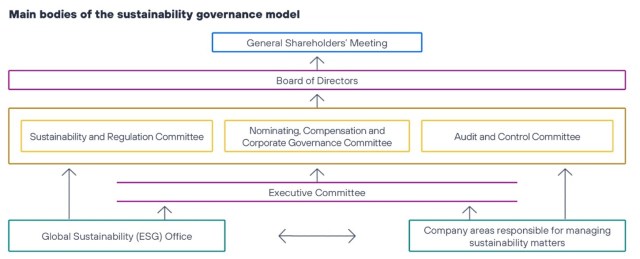Leading by example is one of the pillars of Telefónica’s ESG strategy. It aims to build trust in a digital environment where values, internal policies and good governance are important.
At Telefónica we strive to maintain high standards of governance, security, privacy and transparency. Our Board is now more diverse, with 40% of members being women and a large majority of independent directors.
The starting point for our actions are our Responsible Business Principles, which are based on integrity, transparency and commitment. They are our code of ethics and our sustainability policy. This means that they govern what we say and do in our daily activity and lay the foundations for us to be a sustainable company, one with a clear and defined ESG strategy.
That is why training on the principles is so important and a continuous, never-ending process. By the end of 2023, over 92,400 employees had received this course.
We also launched the ESG Academy, a training space aimed at the entire Telefónica workforce with online content and in-person courses to promote a culture of sustainability.
In 2023 we created the ESG Academy, a sustainability training space for Telefónica employees
Responsible Business Plan
To ensure that our Responsible Business Principles are the common thread running through everything we do, we produce a Responsible Business Plan.
This includes projects under the pillars of our GPS (Growth, Profitability and Sustainability) strategic plan to transform customer relationships, streamline the operating model and create long-term value.
The Global Sustainability (ESG) Office is the area in charge of preparing this Plan (based on the materiality analysis), which includes targets, monitoring indicators and action plans for this area and is approved by the Board of Directors.
Some of the targets set are also incorporated into the variable remuneration of all employees, including the members of the Executive Committee.

Sustainability governance at Telefónica is designed to make sustainability a cross-cutting element at all levels of the Company.

In 2023, we adjusted our variable remuneration model to align it with our GPS strategic plan. Some 20% of the VRS (Variable Remuneration System) determining the pay received by our professionals is linked to ESG, the customer NPS, carbon emissions reduction and gender equality targets.
Our vision is to strengthen our culture of ethics and compliance by bolstering the standards of adherence to mandatory rules and maintaining best-in-class business and ethical practices.
This requires employees who are very conscious of their decisions. To help them, we have trained 94,990 people in anti-corruption since 2022. Similarly, extending our zero tolerance of corruption and bribery throughout the supply chain is key. To do so, we provided integrity information to over 5,800 suppliers last year.
Our Queries Channel is available online in different languages for all our stakeholders, including suppliers.

We strive to be a benchmark in fiscal transparency. MSCI and S&P DJSI have once again awarded us the highest score for this year.
Beyond complying with the law, we are aware that our contribution is an important factor for economic and social development.
In 2023, our total tax contribution (TTC) amounted to €7.579 billion. The contribution is equivalent to €19 for every €100 of turnover. It is worth highlighting, for example, the taxes incurred and collected amounting to €2.887 billion in Spain and €2.205 billion in Brazil.

The monitoring of customer data requires high privacy and security standards. This allows us to build trust in a digital environment. We have been the leading telco since 2020 according to Ranking Digital Rights and we continue to build on this:
- Protection: data must be secure and the privacy of individuals must be preserved. This is the basis when designing our services and collaborating with third parties.
- Design: we apply privacy and security from the design, that is, from the initial concept of our products and services and throughout the development process.
- Empowerment: individuals must be able to manage and have control over their personal data. In this way, access to their data, and to additional information on risks and benefits associated with their management, is made possible.
- Transparency: we provide people with simple tools that allow them to control their data.
Ranking Digital Rights evaluates commitments, policies and practices that affect customers’ freedom of expression and privacy
The launch of our Binding Corporate Rules (BCRs) this year will enable us to increase our level of commitment to privacy.
In addition, over 95% of contracts or RFPs with our suppliers will contain security requirements by 2025.

Sustainable supply chain management is part of the Responsible Business Plan, which is approved by the Board of Directors. The Sustainability and Regulation Committee of the Board of Directors oversees its implementation and monitors the targets.
At Telefónica, we require 100% of our suppliers to conduct their activities while applying ethical standards similar to ours. This ensures respect for core human rights and labour rights, as well as the protection of the environment.
On this basis, our approach to governance and work is underpinned by two factors, namely risk management and supplier engagement.
To assess the performance of our potentially high-risk suppliers, we use external tools such as the IntegrityNext platform and Factiva, the database developed by Dow Jones Risk & Compliance. We also conduct audits through our internal Allies programme for service providers and the Joint Alliance for CSR (JAC) sector initiative for product manufacturers.
In 2023 we conducted 18,324 administrative or on-site audits. Given the results obtained, at the end of the year we had 853 suppliers with improvement plans.

All of our suppliers are required by Telefónica to operate with stringent sustainability standards similar to our own
As part of our supply chain decarbonisation strategy, over the past year, we have required our key suppliers to commit to emission reduction targets validated by the Science Based Targets Initiative.
We strengthen our Scope 3 engagement with suppliers by providing them with tailor-made training as part of the Supplier Engagement Programme and working on emissions reductions at product level as part of the Carbon Reduction Programme.
We have reduced CO2 emissions from our value chain by 31% compared to 2016, with emissions from our supply chain being the most significant in our Scope 3 emissions (64%).

Sustainable financing is a key tool for supporting the transformation of the business through investment in projects with a positive environmental and social impact.
Telefónica was the first issuer of senior green bonds and hybrid (green and sustainable) instruments in the telecommunications sector. The funds raised have mainly been used for projects to transform the network from copper to fibre, which is more efficient and has fewer faults, as well as to deploy and improve mobile connectivity in rural areas.
Our aim is to have around 40% of our financing activity meeting sustainable criteria by 2026.
At the end of 2023, the Company had obtained financing linked to sustainability criteria amounting to €18.8 billion, positioning Telefónica among the leaders in the sector. This represents 33.6% of the Company’s total financing.
ESG Report 2023
Summary of the Company’s mission, strategy and progress in economic, environmental, social and governance matters.


